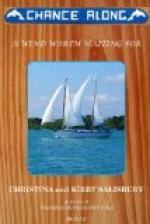Still meditating his plight, Pierce Phillips edged out of the crowd and walked slowly down the street. It was not a street at all, except by courtesy, for it was no more than an open waterfront faced by a few log buildings and a meandering line of new white tents. Tents were going up everywhere and all of them bore painful evidence of their newness. So did the clothes of their owners for that matter—men’s garments still bore their price-tags. The beach was crowded with piles of merchandise over which there was much wrangling, barges plying regularly back and forth from the anchored ships added hourly to the confusion. As outfits were dumped upon the sand their owners assembled them and bore them away to their temporary camp sites. In this occupation every man faced his own responsibilities single-handed, for there were neither drays nor carts nor vehicles of any sort.
As Phillips looked on at the disorder along the water’s edge, as he stared up the fir-flanked Dyea valley, whither a steady stream of traffic flowed, he began to feel a fretful eagerness to join in it, to be up and going. ’Way yonder through those hills towered the Chilkoot, and beyond that was the mighty river rushing toward Dawson City, toward Life and Adventure, for that was what the gold-fields signified to Phillips. Yes, Life! Adventure! He had set out to seek them, to taste the flavor of the world, and there it lay—his world, at least—just out of reach. A fierce impatience, a hot resentment at that senseless restriction which chained him in his tracks, ran through the boy. What right had any one to stop him here at the very door, when just inside great things were happening? Past that white-and-purple barrier which he could see against the sky a new land lay, a radiant land of promise, of mystery, and of fascination; Pierce vowed that he would not, could not, wait. Fortunes would reward the first arrivals; how, then, could he permit these other men to precede him? The world was a good place—it would not let a person starve.
To the young and the foot-free Adventure lurks just over the hill; Life opens from the crest of the very next divide. It matters not that we never quite come up with either, that we never quite attain the summit whence our promises are realized; the ever-present expectation, the eager straining forward, is the breath of youth. It was that breath which Phillips now felt in his nostrils. It was pungent, salty.
He noted a group of people gathered about some center of attraction whence issued a high-pitched intonation.
“Oh, look at the cute little pea! Klondike croquet, the packer’s pastime. Who’ll risk a dollar to win a dollar? It’s a healthy sport. It’s good for young and old—a cheeild can understand it. Three Eskimo igloos and an educated pill!”




